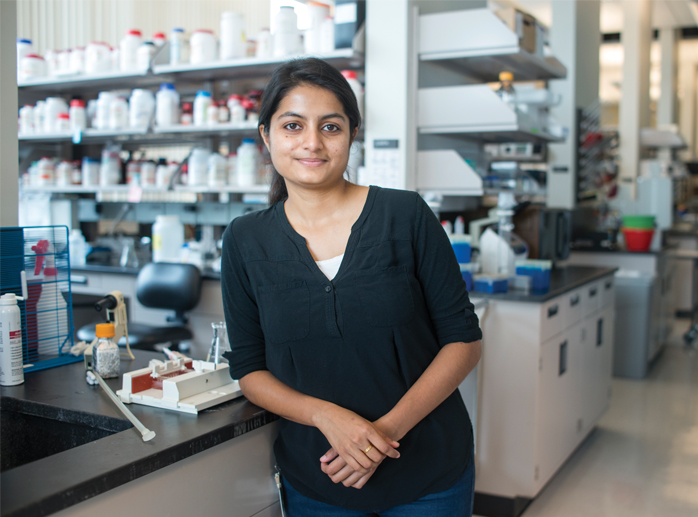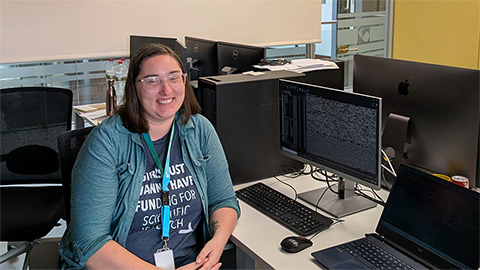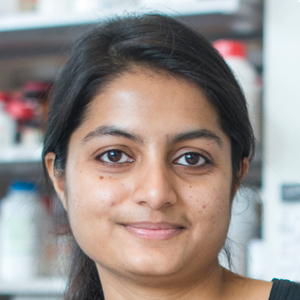It’s the journey that counts
Ph.D.: These three letters evoke a wide range of emotions and opinions among people who have been through the process, successfully completed it or are still in graduate school. You can find many blogs talking about things you should keep in mind before choosing a Ph.D. program, rules you should follow as a graduate student and so on and so forth. When I was a master’s student, all the advice and opinions overwhelmed me. So I took a year off after my master’s degree and worked in a lab to figure out if I liked research. I did. I got some data, so I was included as an author in a publication within a year! This boosted my confidence, so I thought I definitely could do a Ph.D. I started graduate school that fall with very high ambitions; little did I realize the actual struggle ahead of me.
 Isha Dey (second from left) poses with fellow graduate students from the Rosalind Franklin University of Medicine and Science (left to right) Nicole Woitiwich, Kalpit Shah, Sahithi Pamarthy and Jiaju Wang at the 2016 American Society for Biochemistry and Molecular Biology Annual Meeting in San DiegoPhotos courtesy of Isha Dey
Isha Dey (second from left) poses with fellow graduate students from the Rosalind Franklin University of Medicine and Science (left to right) Nicole Woitiwich, Kalpit Shah, Sahithi Pamarthy and Jiaju Wang at the 2016 American Society for Biochemistry and Molecular Biology Annual Meeting in San DiegoPhotos courtesy of Isha Dey
After joining a lab, I started working toward purifying a kinase to study its in vitro functions. This required a lot of biochemical experiments, something I had not done before. It was a difficult protein to start with, as it is membrane bound. So I started learning different ways of expressing it and then sequentially purifying it using various chromatographic and other methods. I was having a really tough time with my experiments. Gradually, I was turning into a lab rat. I had no life outside of lab. I hung out with my friends less because I worked almost every weekend. I knew my lifestyle was not healthy, but I was so determined to get a pure functional protein that I ignored the warning signs. In the meantime, two of my colleagues quit the graduate program. Terrified that the same fate awaited me, I started working even harder because I did not want to fail as a Ph.D student. After three years, the unexpected happened — my project failed
I had no idea what to do next. All I could think of was how all my effort had been in vain and what a complete failure I was as a graduate student. I thought maybe I should just quit the program.
That’s when my adviser had a discussion with me. First he gave me a new project to work on, for which I was to learn molecular biology and cell biology techniques. Then he encouraged me to engage in extracurricular activities, asking me to mentor a high school student who was to work in the lab that summer. And he explained one thing that has been a driving force for me since then: He said a project might fail, but that does not mean the student is a failure. Graduate school is a training phase; it is more important to learn new things and gain as much expertise as possible, both technical and intellectual, than it is to succeed with some experiments. It was then I realized that even though my project had failed, I had learned quite a few chromatography techniques well enough to teach others to perform them.
Thus started what I like to call phase two of my Ph.D. I decided one thing at the very beginning of this phase: I would not be confined to the lab at all times. I would have a life outside of research. At that time, three senior graduate students were spearheading community science outreach programs outside their lab work. I thought to myself, if they can manage so many things, why can’t I?
 Isha Dey in her lab at the Rosalind Franklin University of Medicine and Science in North Chicago, Ill.
Isha Dey in her lab at the Rosalind Franklin University of Medicine and Science in North Chicago, Ill.
I figured that I needed to be more organized and disciplined with my work. In fact, mentoring summer students in the lab was a good experience. I realized that I had to know my subject very well in order to simplify it for high school students to understand and that I enjoyed teaching. Moreover, I got more involved in extracurricular activities through our graduate student association and through other avenues. Slowly, I was beginning to develop multitasking skills. I was starting my project from scratch and, at the same time, had other activities going on. But with proper time management and planning, all my work and activities did not seem overwhelming. Surprisingly, I started to enjoy my research more. Yes, not all my experiments worked, but I could handle the situation much better than before.
As I look back to the past 4 1/2 years, I wish I had known a few things before starting graduate school. I wish I had known that a Ph.D. is not just about doing experiments and getting meaningful data. In this era of “publish or perish,” the more papers we publish, the better our CVs stand out in academia. But it’s research, and things might not always turn out the way we expect. No matter how many blogs we read or how many rules we follow, there will be unexpected outcomes. Experimental failures (big or small) are part and parcel of research. The more important thing is to train oneself as a researcher. This includes independent thinking and designing experiments, understanding the rationale behind experiments, gaining technical expertise and troubleshooting, and learning to analyze data and give good presentations, as well as learning to teach, to do scientific writing, to network — overall, to strive to become an independent researcher.
Had I known this from the beginning, maybe the failure of my first project would have not been so demoralizing. Also, I would have made the time to focus on other important things like building up my networking skills, learning better presentation methods and nurturing my hobbies. I would have led a healthier life.
Thus, my journey so far in graduate school has also been a personal training phase. It has helped me build resilience; I feel I am better prepared to face challenges now. Moreover, I have learned the importance of work-life balance; as a graduate student, my research and its outcome definitely should be a priority, but I should not make it the sole purpose of my life.
Enjoy reading ASBMB Today?
Become a member to receive the print edition four times a year and the digital edition monthly.
Learn moreGet the latest from ASBMB Today
Enter your email address, and we’ll send you a weekly email with recent articles, interviews and more.
Latest in Opinions
Opinions highlights or most popular articles

Women’s health cannot leave rare diseases behind
A physician living with lymphangioleiomyomatosis and a basic scientist explain why patient-driven, trial-ready research is essential to turning momentum into meaningful progress.

Making my spicy brain work for me
Researcher Reid Blanchett reflects on her journey navigating mental health struggles through graduate school. She found a new path in bioinformatics, proving that science can be flexible, forgiving and full of second chances.

The tortoise wins: How slowing down saved my Ph.D.
Graduate student Amy Bounds reflects on how slowing down in the lab not only improved her relationship with work but also made her a more productive scientist.

How pediatric cataracts shaped my scientific journey
Undergraduate student Grace Jones shares how she transformed her childhood cataract diagnosis into a scientific purpose. She explores how biochemistry can bring a clearer vision to others, and how personal history can shape discovery.

Debugging my code and teaching with ChatGPT
AI tools like ChatGPT have changed the way an assistant professor teaches and does research. But, he asserts that real growth still comes from struggle, and educators must help students use AI wisely — as scaffolds, not shortcuts.

AI in the lab: The power of smarter questions
An assistant professor discusses AI's evolution from a buzzword to a trusted research partner. It helps streamline reviews, troubleshoot code, save time and spark ideas, but its success relies on combining AI with expertise and critical thinking.

